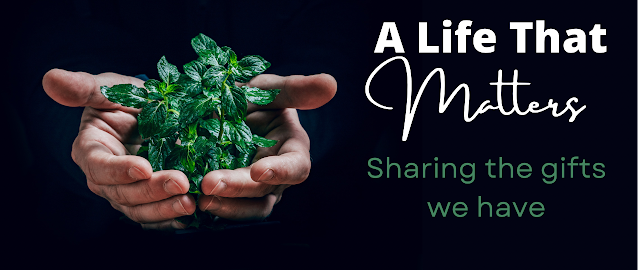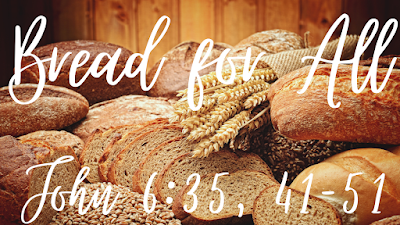The Joy of Home - Luke 3:7-18 (Advent 3C)
How should we live? You don't ask yourself that question, right? Oh, you don't? I guess I'm the weirdo here then. There are so many shoulds in our lives, especially now during Advent. Should we send Christmas cards, should we visit our estranged extended families?
We should be living with joy. The candle that was lit this morning is a representation of that joy. Although it doesn’t come across as such, this scripture is about joy. Last week, we began this set of scripture with John the Baptist, and he was brought to focus on the Messiah - whose time has not come yet. He was sent to prepare the world for the arrival. Screaming at the crowds who come to you, doesn’t seem like the right vibe? Let’s go through the text slowly to set the scene…
Luke sets up John like this… the crowds came to him to be baptized. Again - still in the wilderness, so these are wanderers, sojourners, disconnected people who wanted to belong. They were looking for something, even something that could be found in the Jordan river. But then… he says, “You BROOD OF VIPERS! Who warned you to flee from the wrath to come?” Oh man… I might reconsider my life choices if this is how this guy is going to talk to me. (Pause for laughter) So… even though you came to bring the good news, there’s bad news that goes with it too? (Pause again) John continues… “Bear fruits worthy of repentance, Do not begin to to say to yourselves, ‘we have Abraham as our ancestor’. (Pause) Repentance - that’s a big word. John is saying here that we cannot just sit on our haunches because of who came before us. They got saved, and now we’re safe because they’re safe. Maybe they even believed that grace and religion was inherited. It’s just something that got passed down. That’s not how it works… John is telling them. As we are well aware of here at Bethany, we have many multi-generational families in our congregation. I honor your faithfulness, and your commitment. I’m sure it didn’t come easy, and I’m sure for those who aren’t here, there may be difficult relationships. Everyone has to find it themselves, and figure out what kind of fruit they will grow. Much as there could be a line of preachers in someone’s family (not mine), or doctors, or any other profession, those skills are not transferred equally to the next generation. But the important part here is that we HAVE fruit - we have signs and truth of the change in our life that God has made. Your priorities change when you live out your repented life and that there are not just seeds, or growth, but FRUIT. (Pause)
I’m going to skip to the next verse, starting “Even now the ax is lying at the root of the trees; every tree therefore that does not bear good fruit is cut down and thrown into the fire.” Wow. (Take a moment) John is not holding anything back from these people who came to him for mercy. Had I been there, this is shocking to even me… I can’t imagine what the people hearing this would have been thinking. This is less of a threat than it is a call to action. As much as it can be interpreted as you’ll be sent to the bad place if you don’t perform, remember this is John speaking, not Jesus. John’s rhetoric is meant to be shocking enough to get people out of their comfort zone and to know that his calls for redemption are real and urgent.
But those who are listening… it’s real easy to listen to this and have all the joy and hope sucked right out of you. These feelings are not sins, but do not help inspire the crowd for action. That’s where the next section comes in.
Now, John visits with three different groups, all asking the same question. “What should we do?” The first group - the “crowd”… John advises them to share what they have, whether clothing or food. They want hope - they want something that they can do to show the repentance they came to John for. In Jewish culture at the time, repentance was shown by offering sacrifices and putting on sackcloth. John’s suggestion would be in line with this, showing that we can bless others through service and sacrifice. Now, John could have said that this crowd should withdraw from the world and seclude itself. But, the individuals are asking how they can show repentance, and helping others is a good way to start, even if it’s just another individual. Caring for the disadvantaged was also a common teaching in Jewish culture. John isn’t saying to impoverish yourself - he says give away your extras. Do any of us have extras? Our world isn’t as different from the ancient Middle Eastern world as we would think. This past summer, we had our series on food deserts and how the hungry are forced to go through many hoops when there is an abundance of food.
The second group that comes to John are the tax collectors, who, in case you haven’t heard it before, were among the least welcome in the community at the time, because they were notoriously corrupt and greedy, and they collaborated with the oppressive Romans. When they ask John how they can be redeemed, or show their repentance, John advises that they collect no more than what is owed. He’s not asking them to stop what they’re doing and follow him, he’s asking for them to be ethical and accountable.
Roman soldiers are the last group that ask John how they can show repentance for their sin, and show their change of heart. This is surprising in a way, but speaks to the universal nature of God’s grace. These are the enemies of the Jewish people, occupying their homeland and making their lives more difficult. And again, John doesn’t tell them to put down their swords and go a different way. He instructs the soldiers to be righteous and blameless with their integrity.
What are some of the people we may substitute for tax collectors and soldiers these days? Think about it. John is here saying that they can also bear fruit, and be part of the Kingdom. He is not excluding anyone. He doesn’t rebuke them for being who God created them to be, even though their choice of careers lead them to where they are. It also lead them to John to be baptized by water, in repentance.
So… Where is the joy in this message? How can we apply this to our lives, you might be thinking? All of the suggestions given by John deal with possessions, deal with justice, deal with relationships and how to treat people. Think about what you’re doing while you’re doing it, to make sure that you are acting with grace, justice, and mercy. Whether in our jobs, like the people were asking John, or in our homes, during the holidays and the rest of the year.
The weather recently has been up and down, cold one day, then warm again the next. This doesn’t seem like typical December weather. Yesterday, I woke up and Aaron came in, pushing the blinds up from the bottom of my window, and there was the sun. It’d been at least a few days since I’d seen it, and it really set me off when it pierced my retinas. I think that’s kind of what John is doing here. He wants people to see the light that is coming. Could he have done it with a different message? Maybe. But if he sugar-coated it, or danced around what he wanted to say, it may not have been as effective.
Living blamelessly, with justice and mercy in our hearts, more than just ethically and with integrity (which is still important!) is how God calls us to live. Behind our transformation when each of us were baptized, and acknowledged in our commitment to the church and each other, we are called to have transformative joy. A joy that transcends any dark clouds, even as hopeless as the world makes it seem sometimes. Live righteously.. and with the God-given purpose you have. Live in generously, with hope, live in community, live like we are reliant on one another for the success or failure of our life experiment.
What should you do? Bear fruit. If you don’t try to make fruit, the joy may be harder to find. If you don’t bear fruit, will you get what you deserve? No, no, a thousand times no. God has redeemed you - fully and wholly. Because you have received the Good News of Jesus Christ, in and through you, it’s the duty of all believers to share that Good News. We continue doing the tasks of our life, going to work, making meals, brushing our teeth, but doing with joy because we have been redeemed to the one who created us.
And there in lies the mystery: how do we continue on in joy, even when people are hurting around us? We know that the Christ child is coming. We know the Savior will be here and is coming back, if not actually, then He can come back through us, whenever our eyes open to the morning sun.
Our joys are found in the home, and in the company we keep, not in the objects that inhabit the space, but through memories, and through experiences. Our joys are fundamentally through God, and the hope and peace that he also shares with us. Friends, close your eyes and hear the words of the prophet Isaiah, verses 12: 2-6, where he says, “Surely God is my salvation; I will trust and not be afraid. The Lord, the Lord, is my strength and my song; he has become my salvation. With joy you will draw water from the wells of salvation. In that day you will say: Give thanks to the Lord, call on his name; make known among the nations what he has done, and proclaim that his name is exalted. Sing to the Lord for he has done glorious things; let this be known to all the world. Shout aloud and sing for joy, people of Zion, for great is the Holy One of Israel among you.” You may open your eyes now.
This week think about how our church shares the Good News. Are we good at it or do we need some help? How do you think people would feel about our church if they knew that Jesus is for everyone, and that no one is perfect? Would that change how we reach out to the community?
There are many ways for our church to get involved with spreading the Good News, and helping food and clothing distribution, or being peacemakers, and ethical and upright citizens. Today is the day God shines through us for care of creation, embracing all of humanity, crying with the starving and struggling. Today is the day God bring good news to the world, releasing the captives, giving sight to the blind, and setting the oppressed free. May we be deliverers of God’s Good News. Amen.




Comments
Post a Comment